
A denture replaces missing teeth and surrounding tissues.
Depending on the number of teeth to be replaced, there are two types of dentures: complete and partial dentures.
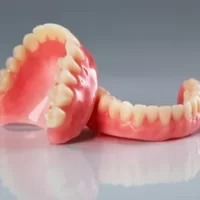
A denture is a removable replacement for missing teeth and the tissues connected to those teeth. It is made of acrylic plastic.
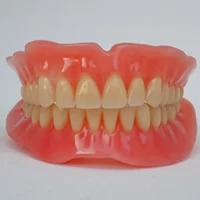
It is a specialized technique to make dentures that fit better, look better, and are more comfortable.
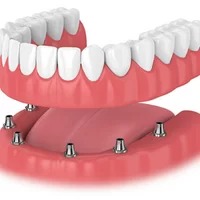
An Implant-Supported Denture is a type of overdenture that is supported by and attached to implants. A regular denture rests on the gums and is not supported by implants. An Implant-Supported Denture is used when a person doesn’t have any teeth in the jaw but has enough bone in the jaw to support implants. It has special attachments that snap onto attachments on the implants, providing greater stability. An Implant-Supported Denture uses implants to support the denture, making it fixed. The chewing power of this denture is much greater than that of a conventional denture.
Partial dentures are used when one or more natural teeth remain in the upper or lower jaw.
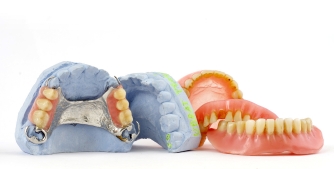
These are made of metal and acrylic. The frameworks of cast partial dentures are designed to fit the teeth precisely. As they sit on and attach to the teeth, they are extremely stable and retentive. The biggest advantage is that sore spots are almost never an issue since neither the framework nor the plastic extensions contact the soft oral tissues with any force.
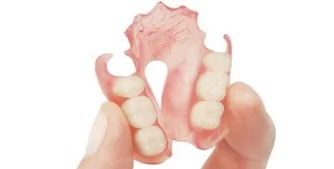
Flexible dentures are:
Comfortable to wear
Lightweight and thin
Easy to clean
Highly elastic
Resistant to breakage
Transparent and match the color of the gums.
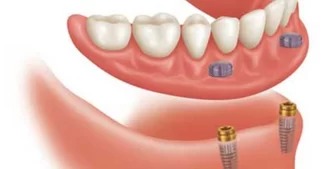
They use dental implants to support the denture, making it fixed. The chewing power of this denture is much greater than that of a conventional denture.
When you lose some of our teeth, their function is carried out by the remaining ones, which overburden them and soon they also start to become loose. Additionally, if there is a gap next to a tooth or there is no opposite tooth, there is always some teeth movement going on to close that space. Consequently, you end up disturbing the natural alignment and harmony of your teeth. That is why you should consider replacement as early as possible after the loss of a tooth.
New dentures may feel a little odd or loose for a few weeks until the muscles of the cheeks and tongue learn to keep them in place and you get comfortable inserting and removing them.
Also, it is not unusual for minor irritation or soreness to occur and for saliva flow to increase when you first start wearing dentures, but these problems will diminish as the mouth adjusts.
Yes, Dental Implants can be used to support permanently cemented bridges, eliminating the need for a denture. The cost is usually greater, but the implants and bridges more closely resemble the feel of real teeth. Dental implants are becoming the alternative to dentures but not everyone is a candidate for implants.
For a complete denture we normally require 5-6 sittings.
A preliminary impression of your bone is made in the first sitting.
In the second sitting the exact location of the borders of the dentures are recorded and final impression is made.
In the third sitting we record the two jaws to each other so that we can set the teeth accordingly. Also selection of appropriate shade and size of teeth is done (according to your facial profile, age, sex and old photographs).
In the next sitting we check the temporary denture in your mouth so that if any discrepancy is there we can correct it there and then.
After the denture delivery you have to come just for minor adjustments.
Remember you have to remove these dentures at night before sleeping and always keep them in water. Also clean your dentures everyday with denture toothbrush and toothpaste or mild soap solution and denture cleansing tablets (weekly)0.
Artificial dentures help enormously in restoring back the function but remember that no artificial replacement can match up to natural dentition. Dentures do have their limitations. In case of complete dentures lower dentures always fall short of expectations as compared to the upper one. This is just because the area of support in the lower jaw for the denture is about half the size of the upper jaw. When you wear dentures for the first time you might feel slight discomfort while speaking or eating or you might develop some ulcers. These findings are absolutely normal. Body takes about 7-14days to adapt to the new dentures. Always remember that the day you get yourdentures is not the last visit to your dentist. When you start using your dentures then only you come to know the main problems you are facing. These minor problems can be easily corrected. This is the reason Implant Supported dentures are preferred.
Dentures are made to closely resemble your natural teeth so there should be no noticeable change in appearance. In fact, dentures may even improve your smile and fill out your facial appearance
If dentures “click” while you’re talking, contact your dentist. Dentures may occasionally slip when you laugh, cough or smile. Reposition the dentures by gently biting down and swallowing. If any speaking problem persists, consult your dentist or prosthodontist.
During the first several days after receiving your denture, it may be necessary to wear it most of the time. Although this may be temporarily uncomfortable, it is the quickest way to identify the areas on the denture that may need adjustment. Once adjustments are made, you should remove dentures before going to bed. This allows gum tissues to rest and allows normal stimulation and cleansing by the tongue and saliva. The denture can be put back in the mouth in the morning.
Implant supported dentures do not require denture adhesive. A denture adhesive may be considered under the following circumstances:




© 2023 All Rights Reserved - Website Managed by Clinic Eximus